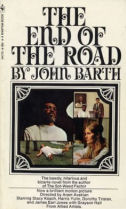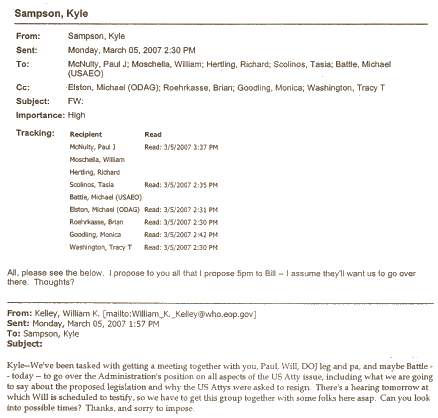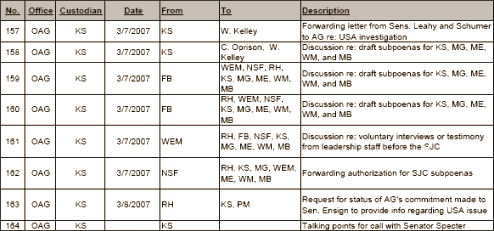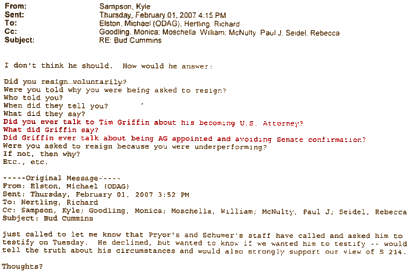Posted on Friday 4 May 2007
 Throughout February, the people at the DOJ were apparently optimistic that they would weather the growing outrage at the firing of the U.S. Attorneys. Attorney General Gonzales and his Deputy Attorney General, Paul McNulty, had both testified, assuring the Senate Judicial Committee that the firings were routine personel issues. Many of the emails were about the newspaper articles and deliberations over various Talking Points for responses. Then came Monday, March 5th – the day before four of the fired Attorneys and William Moschella, Principal Associate Deputy Attorney General were to testify. The DOJ was humming as various versions of Moschella’s Opening Statement and Talking Points were emailed back and forth for editing. Then, after lunch, William Kelly called a White House meeting about "what we are going to say about the proposed legislation and why the US Attorneys were asked to resign." They met at 5 PM. The people from DOJ are on this email. William Kelly, Fred Fielding, and Karl Rove were also there. Who knows who else?
Throughout February, the people at the DOJ were apparently optimistic that they would weather the growing outrage at the firing of the U.S. Attorneys. Attorney General Gonzales and his Deputy Attorney General, Paul McNulty, had both testified, assuring the Senate Judicial Committee that the firings were routine personel issues. Many of the emails were about the newspaper articles and deliberations over various Talking Points for responses. Then came Monday, March 5th – the day before four of the fired Attorneys and William Moschella, Principal Associate Deputy Attorney General were to testify. The DOJ was humming as various versions of Moschella’s Opening Statement and Talking Points were emailed back and forth for editing. Then, after lunch, William Kelly called a White House meeting about "what we are going to say about the proposed legislation and why the US Attorneys were asked to resign." They met at 5 PM. The people from DOJ are on this email. William Kelly, Fred Fielding, and Karl Rove were also there. Who knows who else?

While Kyle Sampson and Monica Goodling knew that the firings had been initiated and masterminded from the White House, as did the White House participants, apparently Paul McNulty and William Moschella didn’t know that. In fact, Paul McNulty had already testified that the White House was not involved. In the meeting, Karl Rove said, "you all need to explain what you did and why you did it." That sounds like a simple point, except that the principles didn’t actually know the answer. They were "in the dark."
A former U.S. Justice Department official and central figure in the firing of eight U.S. attorneys tearfully told a colleague two months ago her government career probably was over as the matter was about to erupt into a political storm, according to closed-door congressional testimony.…Margolis testified in private that he tried to console Goodling and listened to her discuss her personal life, a congressional aide said. He recalled telling a colleague that he was concerned about Goodling’s emotional state, the aide said.…Three hours before Goodling visited his fourth-floor office, Margolis told House and Senate investigators that Sampson dropped by to say he had information Margolis needed to know, one congressional aide said.Margolis recounted that Sampson read his e-mail exchanges with White House aides that showed the decisions on firing the prosecutors were closely coordinated with members of the president’s staff, the aide said.
Margolis recalled that he was stunned to learn the extent of White House involvement in the dismissals, congressional aides said. Margolis testified that preparation for McNulty’s Senate testimony — which took place more than a month before his meetings with Goodling and Sampson — was based on the assumption that the White House only became involved at the end of the firing process, the aide said.
McNulty told the Senate Judiciary Committee on Feb. 6 that the White House’s only involvement was that presidential aides were informed of the decision before the U.S. attorneys were told. Charles E. Schumer, the New York Democrat leading the Senate investigation into the dismissals, has since said that he believes McNulty may have been misled by Sampson.…After Sampson left his office, Margolis testified that he went toward McNulty’s office to inform his boss and stopped because Sampson had already gone into the room carrying the binder filled with White House e-mails, the aide said.
We shall not cease from exploration
And the end of all our exploring
Will be to arrive where we started
And know the place for the first time.




 According to a congressional aide, McNulty said he attended a White House meeting with Karl Rove, President Bush’s top political adviser, and other officials on March 5, the day before McNulty’s deputy William Moschella was to testify to Congress about the firings.
According to a congressional aide, McNulty said he attended a White House meeting with Karl Rove, President Bush’s top political adviser, and other officials on March 5, the day before McNulty’s deputy William Moschella was to testify to Congress about the firings.  The problem, according to the Democratic aide, is that Rove and Kelley never told Moscella about the White House’s own role in pushing to have some U.S. attorneys fired in the first place. Moscella followed the coaching by Rove and others—and made no mention of White House involvement in the firings during his March 6, 2007 testimony to House Judiciary. “They let Moscella come up here without telling him the full story,” said the Democratic staffer…
The problem, according to the Democratic aide, is that Rove and Kelley never told Moscella about the White House’s own role in pushing to have some U.S. attorneys fired in the first place. Moscella followed the coaching by Rove and others—and made no mention of White House involvement in the firings during his March 6, 2007 testimony to House Judiciary. “They let Moscella come up here without telling him the full story,” said the Democratic staffer…

 A catalogue of errors over planning for Iraq after the invasion, and an inability to influence key figures in the US administration, led to anarchy in Iraq from which the country has not recovered, the British defence secretary during the invasion admits today.
A catalogue of errors over planning for Iraq after the invasion, and an inability to influence key figures in the US administration, led to anarchy in Iraq from which the country has not recovered, the British defence secretary during the invasion admits today. The British Defense Secretary is at least willing to say what all of us know – that in the first couple of years of the war, the man making the calls was Dick Cheney. And his calls were uniformly bad calls – informed more by his paranoid personality than by anything coming from the actual situation of any experience with such matters. In the First Gulf War, he looked good. How else could he look? We went in with a full force, a great general, got the job done, then came home.
The British Defense Secretary is at least willing to say what all of us know – that in the first couple of years of the war, the man making the calls was Dick Cheney. And his calls were uniformly bad calls – informed more by his paranoid personality than by anything coming from the actual situation of any experience with such matters. In the First Gulf War, he looked good. How else could he look? We went in with a full force, a great general, got the job done, then came home. 